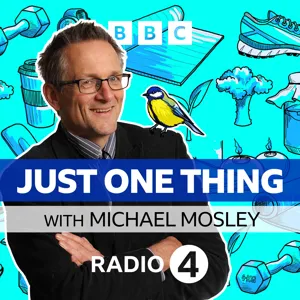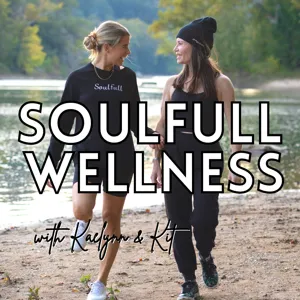Podcast Summary
Small daily routine changes for better health: Drinking tea can lower stress, improve memory, and reduce risk of bone fractures, making it a simple yet effective practice for better health.
Making small changes to your daily routine, such as having a cup of tea, can have significant positive impacts on both your mental and physical health. According to doctor Michael Mosley on the BBC World Service podcast "Just One Thing," millions of people, including Evan from the Noom weight loss program, have experienced improvements in their well-being through personalized plans and simple actions. For instance, drinking tea, which is a popular and relaxing ritual in the UK, has been shown to lower stress levels, improve memory, and reduce the risk of bone fractures. So, consider trying this simple yet effective practice as part of your daily routine. And remember, everyone's journey to better health is unique, so find what works best for you. Whether it's a personalized weight loss plan, a comfortable sleep environment, or a soothing cup of tea, the key is to start small and stay consistent.
Exploring the Health Benefits of Tea: Tea from camellia sinensis plant offers health benefits like improved focus, relaxation, stress reduction, and bone protection. L-theanine in black tea enhances brain function with caffeine.
Tea, beyond being a pleasant warm beverage, offers various health benefits. These benefits include improved concentration, relaxation, and even protection against bone fractures due to its polyphenol content. Additionally, the compound L-theanine in black tea can help reduce stress and enhance brain function when consumed with caffeine. The speaker aims to encourage the listener to incorporate tea into their daily routine for these reasons. Tea comes from the camellia sinensis plant and is rich in polyphenols, which have been linked to numerous health advantages. Furthermore, green tea, derived from the same plant, undergoes different processing methods but retains similar health benefits. The speaker's personal connection to tea and its potential benefits led them to challenge themselves to drink a few cups a day and share the experience.
Tea's impact on brain activity and potential longevity benefits: Drinking tea can enhance brain function by increasing alpha brain waves, leading to relaxation and improved information absorption. Regular tea consumption may contribute to a longer lifespan, even when consumed with milk or sugar.
Theanine, an amino acid found in tea, can increase alpha brain wave activity, leading to a calm and alert state, potentially improving information absorption and creativity. Additionally, regular tea consumption, especially when it comes to stroke and heart disease, may contribute to a longer lifespan. A study involving nearly half a million people in the UK showed this effect remained even when tea was consumed with milk or sugar. During the tea challenge, participants reported finding time to enjoy their cups and experience relaxation, enhancing the potential benefits. Professor Andrew Steptoe, an expert on tea's benefits, confirmed these findings through controlled studies, showing that the active ingredients in tea can help reduce stress responses. These benefits are not just psychological but also measurable through objective tests like blood pressure and stress hormone levels.
Tea consumption for stress relief and heart health: Drinking tea, especially during stress, increases GABA in brain for relaxation, reduces inflammation and platelet activation for heart health.
Drinking tea, particularly during stressful situations, may lead to faster post-stress adaptation and recovery. This effect could be due to theanine, a component in tea that increases the levels of the neurotransmitter GABA in the brain, which is associated with relaxation and decreased anxiety. Additionally, tea consumption has been linked to heart health benefits, including reduced inflammation and platelet activation. The way tea is prepared, such as steeping time and the presence of milk or sugar, may affect the tea's beneficial effects. Overall, incorporating tea into one's daily routine could potentially lead to improved stress response and heart health.
Discover the benefits of replacing coffee with tea: Tea can relieve stress, protect the heart, and boost brain function. Replacing coffee with tea can lead to a calmer day and positive health outcomes.
Incorporating tea into your daily routine can have numerous benefits for your body and mind. The speaker shared his experience of replacing his morning coffee with tea, leading to a calmer day and multiple health advantages. Tea is known to relieve stress, protect the heart, and boost brain function. While coffee may be more effective for workouts, tea is a simple and effective addition to your daily routine that can make a significant difference. Whether it's a cup of tea in the morning or throughout the day, it's a small change that can lead to positive health outcomes. So, consider making the switch to tea and enjoy its multiple benefits. For more insights on simple changes that can make a big difference, tune in to the Just One Thing podcast on BBC Sounds.




